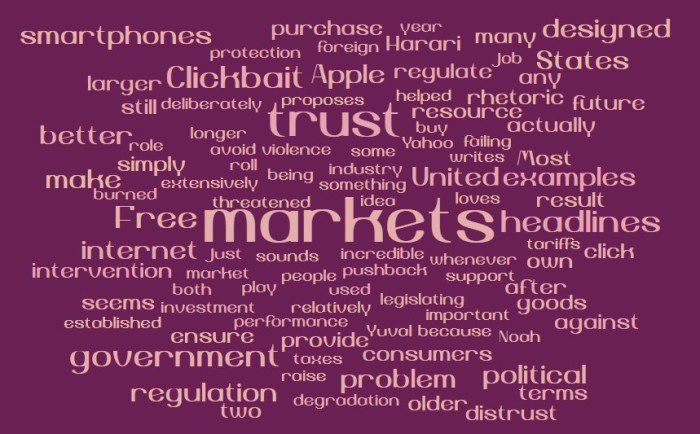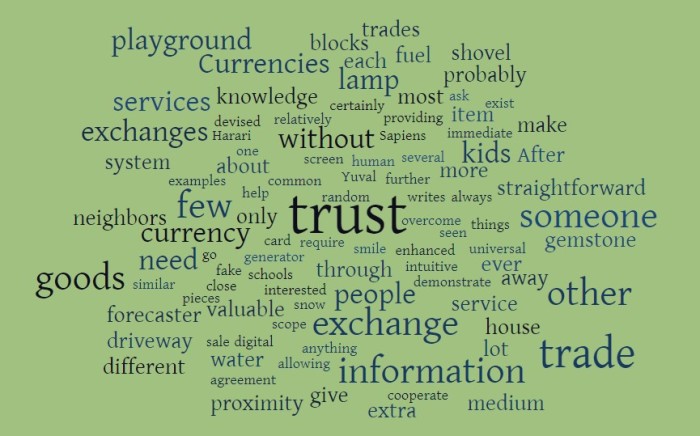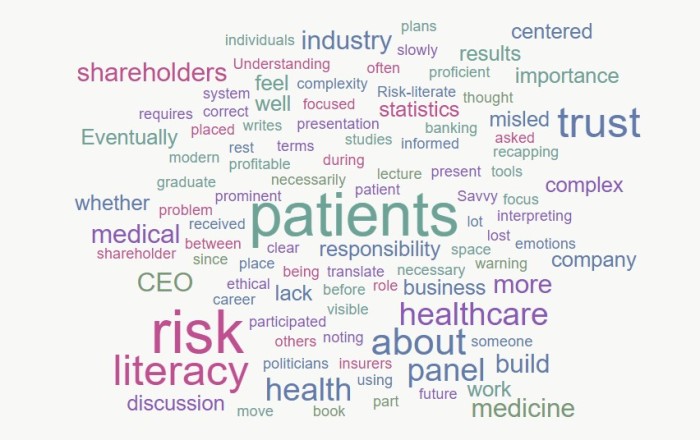Tag: Trust
Markets & Political Bias
Limitations of Money: Market Outsiders and Impersonal Systems
Something I have noticed in my own life recently is that I am less patient and less personable with random strangers in stores. My wife and I do most of our grocery shopping on the weekends, but typically each week we have a meal planned that will turn out much better if I pick up a single ingredient the day we cook that meal rather than four or five days ahead of time during our weekend shopping. This means that usually at least once a week (more if I forgot an important item) I am running to the store after work. During these trips I’m usually in a little hurry to pick up what I need, get through the afternoon rush hour traffic quickly, and make my way through the store and everyone else who is at the store after work to get home and start cooking. I know what I want at the store, where it is in the store, and I’m not really interested in chatting with a random person who I may never see again about the weather, local sports, or some peculiarity of the grocery store. Sometimes I feel bad about it, but I just don’t feel like engaging in personal chit-chat with the grocery store employees or other shoppers. I’m simply on a cold and heartless shopping mission.
My story reflects one of the limitations of money and markets. It enables trust between people and helps organize and order our lives, but it doesn’t really build community or relationships between people. This heartless impartiality of money is a fair critique and it is one of two primary critiques that Yuval Noah Harari presents against money in his book Sapiens. Harari isn’t denouncing money, but he is demonstrating that money and economics are an insufficient explanation for human global expansion and dominance. Humans live as a globally connected species, forming relationships and connections with people from Alaska to Japan to South Africa to England and back again. Money and modern economies helped us forge this global path, but there are things within the human experience that lie beyond the reach of money and the markets that currencies enable. To explain how we got to where we are today, we have to consider economics, but also look beyond money.
“Human communities and families,” Harari writes, “have always been based on beliefs in priceless things, such as honor, loyalty, morality, and love. These things lie outside the domain of the market.” There are certain things we cannot buy and sell, or at least if we do, we are aware that they are not exactly genuine. Purchasing honor, love, or loyalty is more like a quid pro quo rental agreement. I provide you with certain financial incentives and you signal a certain amount of honor, love, or loyalty back toward me. Like modern college football coaches, as soon as a better financial opportunity comes along, all the rhetoric around such values is out the window and all those values are instantly transferred to someone else. Humans don’t cooperate on large scales and build massive societies and institutions simply because someone payed a lot of people to do so. Something more intangible to human existence is necessary.
Markets and money don’t seem to be able to reach those intangibles. Money fosters cooperation and trust between people, but doesn’t necessarily get people to connect and relate to one an other or feel any sense of mutual respect and geniality between one another. My grocery store example demonstrates this. The store trusts that my plastic card will transfer sufficient digital numbers to the store in exchange for the steak that I am taking with me. But I don’t have any real loyalty or good will toward the store and it’s employees. Harari continues, “for although money builds universal trust between strangers, this trust is invested not in humans, communities, or sacred values, but in the money itself and in the impersonal systems that back it. We do not trust the stranger, or the next-door neighbor, we trust the coin they hold. If they run out of coins, we run out of trust.”
Money can break down barriers between groups of people. It can facility trade, cultural sharing, knowledge spread, and tolerance. But it isn’t enough for humans to be a globally peaceful and cooperative species. Money is off limits in some domains, as there are certain things that lie outside the realm of markets. Money doesn’t build meaningful relationships between people in a way that forms long lasting and deep trust and engagement between people. It seems to have been necessary for human global dominance, but insufficient to explain exactly how we have arrived at the modern world we inhabit today.
Money is the Root of all Large Scale Social Cooperation
In his book Sapiens, Yuval Noah Harari writes, “for thousands of years, philosophers, thinkers, and prophets have besmirched money and called it the root of all evil. Be that as it may, money is also the apogee of human tolerance.” Calling money evil is shortsighted. Even saying the pursuit of money is evil is shortsighted. The reality is that humans evolved in small tribal groups where mates were not evenly distributed. Social status and power were important factors in who was able to mate and pass their genes along to the next generation. For ancient hunter-gatherer tribes this often meant that the most physically dominant, the most well connected socially, or those who rose to the highest social status by other means became the person to pass their genes along. The key was accumulating social status and demonstrating status so that everyone knew about it. We can do that today with money, but we can also accumulate wealth, power, and prestige and signal those things through means other than money. Harari calls this out in his book and suggests that money has actually had much more important values throughout the human experience than just serving as the root of all evil as men try to compete for status and power.
Harari continues, “money is more open-minded than language, state laws, cultural codes, religious beliefs, and social habits. Money is the only trust system created by humans that can bridge almost any cultural gap, and that does not discriminate on the basis of religion, gender, race, age, or sexual orientation.” Money enables human trust and cooperation at a grand scale. As Joseph Henrich explains in The WEIRDest People in the World, human tribes broke away from family, clan, and guild centric groups in part through trust that money could build across groups. There was of course much more to the story, but currencies enabled cooperation, trust, and coordination among humans at a large scale, something that other institutions had difficulty accomplishing.
Today people complain about companies and corporations pandering to certain groups or messaging and marketing their goods and services in ways that reinforce what is often called identity politics. The reality is that businesses need to be profitable to survive, and that means they need to convince people to purchase their products and services or shop in their stores. Money and currencies can flow between people of differing demographics and ideologies, allowing for cooperation where none would exist before. Messaging and signaling to people that they should spend their money in a certain way is not an evil, but is a demonstration of tolerance and acceptance. Rather than an evil, money and currency pushes a more accepting stance, even if that means that companies are slow to denounce clearly objectionable people and beliefs and slow to push for needed reforms and innovations. I think it is fair to argue that has more of a moderating effect, limiting the extreme and irrational rejection of some groups in an attempt to sell to the general middle or in a willingness to lose the fringes to remain more in the middle of opinions and beliefs generally. In the end, money, as corporations demonstrate, builds more trust and cooperation among people with different identities and ideologies than would otherwise exist.
Ultimately, money is the root of all large scale cooperation, but not necessarily the root of all evil. It is a neutral tool that has encouraged less discriminatory and biased stances at the same time that is has been a means for signaling dominance and status. Without money we likely couldn’t exist as a global species that interacts and cooperates peacefully a majority of the time.
Money – Signaling & Counterfeiting
Money & Trust
Risk Literacy Builds Trust
In his book Risk Savvy Gerd Gigerenzer writes about a private medical panel and lecture series that he participated in. Gigerenzer gave a presentation about the importance of risk literacy between doctors and their patients and how frequently both misinterpret medical statistics. Regarding the dangers this could pose for the medical industry, Gigerenzer wrote the following, recapping a discussion he had with the CEO of the organization hosting the lectures and panel:
“I asked the CEO whether his company would consider it an ethical responsibility to do something about this key problem. The CEO made it clear that his first responsibility is with the shareholders, not patients or doctors. I responded that the banks had also thought so before the subprime crisis. At some point in the future, patients will notice how often they are being misled instead of informed, just as bank customers eventually did. When this happens, the health industry may lose the trust of the public, as happened to the banking industry.”
I focus a lot on healthcare since that is the space where I started my career and where I focused most of my studies during graduate school. I think Gigerenzer is correct in noting that risk literacy builds trust, and that a lack of risk literacy can translate to a lack of trust. Patients trust doctors because health and medicine is complex, and doctors are viewed as learned individuals who can decipher the complexity to help others live well. However, modern medicine is continuing to move into more and more complex fields where statistics and risk play a more prominent role. Understanding genetic test results, knowing whether a given medicine will work for someone based on their microbiome, and using and interpreting AI tools requires proficient risk literacy. If doctors can’t build risk literacy skills, and if they cannot communicate risk to patients, then patients will feel misled, and the trust that doctors have will slowly diminish.
Gigerenzer did not feel that his warning at the panel was well received. “The rest of the panel discussion was about business plans, which really captured the emotions of the health insurers and politicians present. Risk-literate doctors and patients are not part of the business.”
Healthcare has to be patient centered, not shareholder centered. If healthcare is not about patients, then the important but not visible and not always profitable work that is necessary to build risk literacy and build trust won’t take place. Eventually, patients will recognize when they are placed behind shareholders in terms of importance to a hospital, company, or healthcare system, and the results will not be good for their health or for the shareholders.
Discount Confidence
Hindsight Bias and Misleading Headlines
Confident, But Wrong









